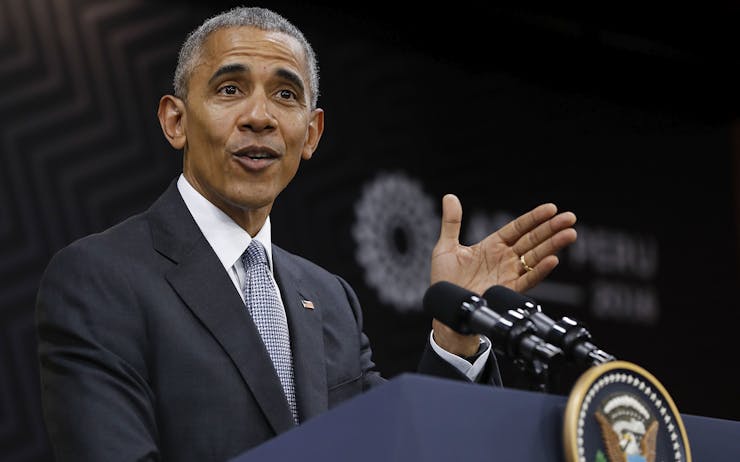My Twitter feed went full berzerker last night over President Obama’s cannabis comments in Rolling Stone. I wish it meant something. But it doesn’t.
Obama on legalization: Timing is everything. And his time is up.
In fact it may mean less than zero.
In case you missed it, President Obama gave a post-election interview to RS founder Jann Wenner. After the obligatory Trump questions, Wenner asked the President about cannabis legalization. An excerpt:
You can now buy marijuana legally on the entire West Coast. So why are we still waging the War on Drugs? It is a colossal failure. Why are we still dancing around the subject and making marijuana equivalent to a Schedule I drug?
Look, I’ve been very clear about my belief that we should try to discourage substance abuse. And I am not somebody who believes that legalization is a panacea. But I do believe that treating this as a public-health issue, the same way we do with cigarettes or alcohol, is the much smarter way to deal with it. Typically how these classifications are changed are not done by presidential edict but are done either legislatively or through the DEA. As you might imagine, the DEA, whose job it is historically to enforce drug laws, is not always going to be on the cutting edge about these issues.[Laughs] What about you? Are you gonna get on the cutting edge?
Look, I am now very much in lame-duck status. And I will have the opportunity as a private citizen to describe where I think we need to go. But in light of these referenda passing, including in California, I’ve already said, and as I think I mentioned on Bill Maher’s show, where he asked me about the same issue, that it is untenable over the long term for the Justice Department or the DEA to be enforcing a patchwork of laws, where something that’s legal in one state could get you a 20-year prison sentence in another. So this is a debate that is now ripe, much in the same way that we ended up making progress on same-sex marriage. There’s something to this whole states-being-laboratories-of-democracy and an evolutionary approach. You now have about a fifth of the country where this is legal.You got up there and said legalize same-sex marriage, and you pushed it right over the edge. …
Well, you know, no. I don’t think that’s how it works. If you will recall, what happened was, first, very systematically, I changed laws around hospital visitation for people who were same-sex partners. I then assigned the Pentagon to do a study on getting rid of “don’t ask, don’t tell,” which then got the buy-in of the Joint Chiefs of Staff, and we were then able to [repeal] “don’t ask, don’t tell.” We then filed a brief on Proposition 8 out in California. And then, after a lot of groundwork was laid, then I took a position.So we’re in the groundwork stage?
One of the things that I think it’s important for progressives to do when we’re in a reflective mode after an election like this is, we can’t have it both ways. We can’t say, “Why aren’t you reaching out to the folks who voted against us? And by the way, why aren’t you maximizing getting 100 percent for the things that those of us, you know, who are already progressive and living on the coasts think should be done right away?” The point is that politics in a big, diverse country like this requires us to move the ball forward not in one long Hail Mary to the end zone, but to, you know, systemically make progress.
These comments are neither surprising nor helpful. They confirm pretty much what Obama has always told us about his take on legalization. In his eyes, it’s a mildly interesting question of legal and political theory. “Typically how these classifications are changed”: Those are not the words of a leader passionate about making that change happen.
Let’s give credit where it’s due: Adult-use legalization now covers one-fifth of the American population because President Obama allowed Colorado and Washington state to proceed. The instrument of that progress—the Department of Justice’s Cole memo—was done precisely “by presidential edict.”
If Obama wanted to push progress on legalization, he could have. He chose to spend his energy elsewhere.
Punting the question to Congress and the DEA is a cop-out. With the Cole memo, Obama did not completely block the progress others were making. If he truly wanted to push progress on legalization, he could have. But he chose to spend his energy and political capital elsewhere.
Given the incoming Trump administration’s reflexive opposition to all things Obama, it’s entirely possible that even these mildly pro-legalization comments by the outgoing president will do the movement more harm than good. A hearty condemnation of legalization, in fact, might jerk the knee of the Obama haters in the direction of positive cannabis reform. Obama’s against it?! That settles it. We’re descheduling on Day One.
Reflective and wistful comments are typical of public officials during the transition to private life. Earlier this year Obama’s former attorney general, Eric Holder, revealed that he was in favor of rescheduling cannabis. “We treat marijuana in the same way we treat heroin,” he said, “and that clearly is not appropriate.” This from the very person who once ran the agency—the DEA operates within the Department of Justice—that made sure law enforcement treated marijuana like heroin.
Holder offered those quotes, of course, once he was safely out of office and powerless to do anything about the situation. In politics, as in comedy, timing is everything. Eight years ago, Obama’s comments in Rolling Stone would have been earthshaking. Today they dissipate and float away like so much smoke in the breeze.




